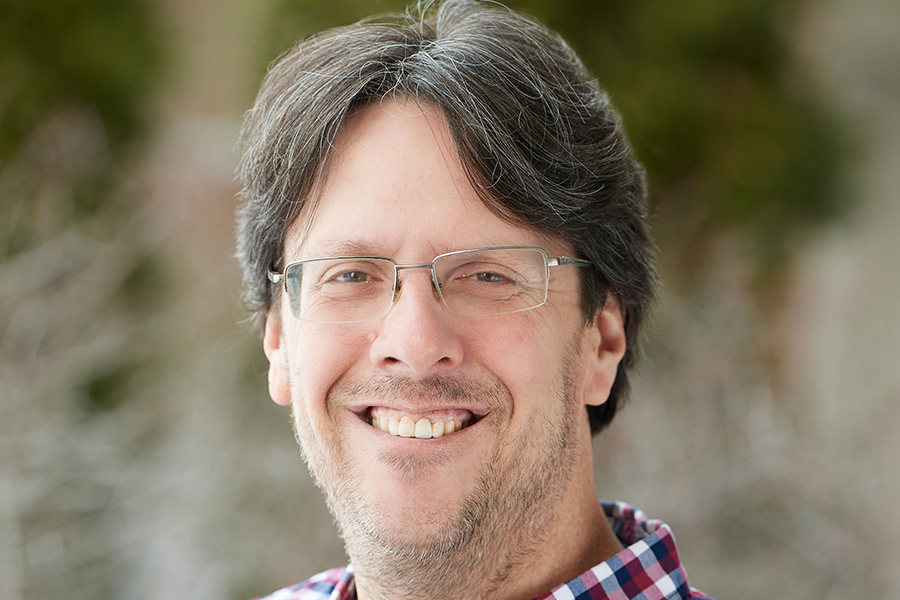Faculty Profile: Darren Mason
Related Posts
Connect With Us
The professor of mathematics and computer science talks about his teaching style, the robust job market and the probability of hearing the same Grateful Dead set list.

Dr. Darren Mason, professor of mathematics and computer science, understands only too well that for many people, the study of numbers and formulas and data is not exactly a walk in the park.
But for the true believers, such as himself, he offers this:
“Learning mathematics and computer science, while challenging, enables students to better understand the data-driven world that surrounds them,” he says. “Any amount of new knowledge is positive. And you don’t have to understand the entirety of math to reap its benefits. Somewhere down the road, math is essential to getting something done and making all of our lives better.”
He offers the example of all the technology that makes our modern lives run; then he politely rests his case.
But Mason, who has taught everything from variational calculus to actuarial science to mechanical engineering at Albion since 2001, is not without sympathy for his students.
“You could say I try to make math as fun as possible, but ‘as possible’ has a lot of teeth to it,” he explains. “I recognize how tough the subject is, so I’ll take students to dinner, I’ll bring doughnuts to class. One of my first assignments in class is for them to come talk to me individually. I’ll have office hours and we’ll talk about anything they want—The Grateful Dead, cheese, your shoe color…. It lets them know me as a human.”
A Minnesota native and first-generation college student, Mason earned his B.S. in mathematics and Ph.D. in engineering mechanics from the University of Minnesota. He added a post-doctorate in math from Carnegie Mellon University and then an assistant professorship mechanical engineering at Michigan State. But he sought an opportunity for more hands-on teaching, which led to his arrival at Albion.
And over the years, Mason has taught in a manner that makes it clear there is more to math than just focusing on it in a vacuum. Math-centric careers—such as actuaries (who analyze data for insurance companies) and data scientists—are among the most in-demand jobs today.
“I’m hoping we can get more and more students involved,” he says about actuarial science. “It’s a big growth area because there will always be jobs for actuaries. Everyone will always need insurance.”
Mason recently added risk management to his teaching repertoire and, when pandemic travel restrictions lift, looks forward to resuming his summers of international teaching, which have taken him in the past to China and Russia.
Erasers Beware
While the subject material tends to be traditional and quite structured, Mason doesn’t approach the craft of teaching math that way.
“I tend to be very casual when I teach,” he says. “I try to make a lot of jokes, often at my own expense. I’ll throw an eraser across the room to illustrate gravity. I also have a very loud voice that I often lose track of, which can be intimidating. So I try to make math as warm and fuzzy as possible. I love students and I love helping them.”
Mason also loves the Grateful Dead. (You may have picked up on that earlier.) He has seen the iconic group some 20 to 30 times in person and owns more than 3,000 hours of Dead shows on CD.
“I really liked that every time you went to a show it was different every time,” says Mason, who saw his first live show in 1986. “I could see the Dead 10 times in a row and every show would have a different set list. I like that they have this weird reputation that they’re an acid rock band but they’re actually more focused on bluegrass, blues and country. It’s very Americana music.”
Yet through all his eclectic approaches and dynamic interests, Mason remains a lover of mathematics and what it can teach anyone who is willing to learn.
“It’s the field with the most certainty,” he says. “You don’t have to do experiments and you don’t have to formulate hypotheses. Once someone proves a new result, that’s it—done. It’s the certainty of it. And when it all works out, it feels great.”